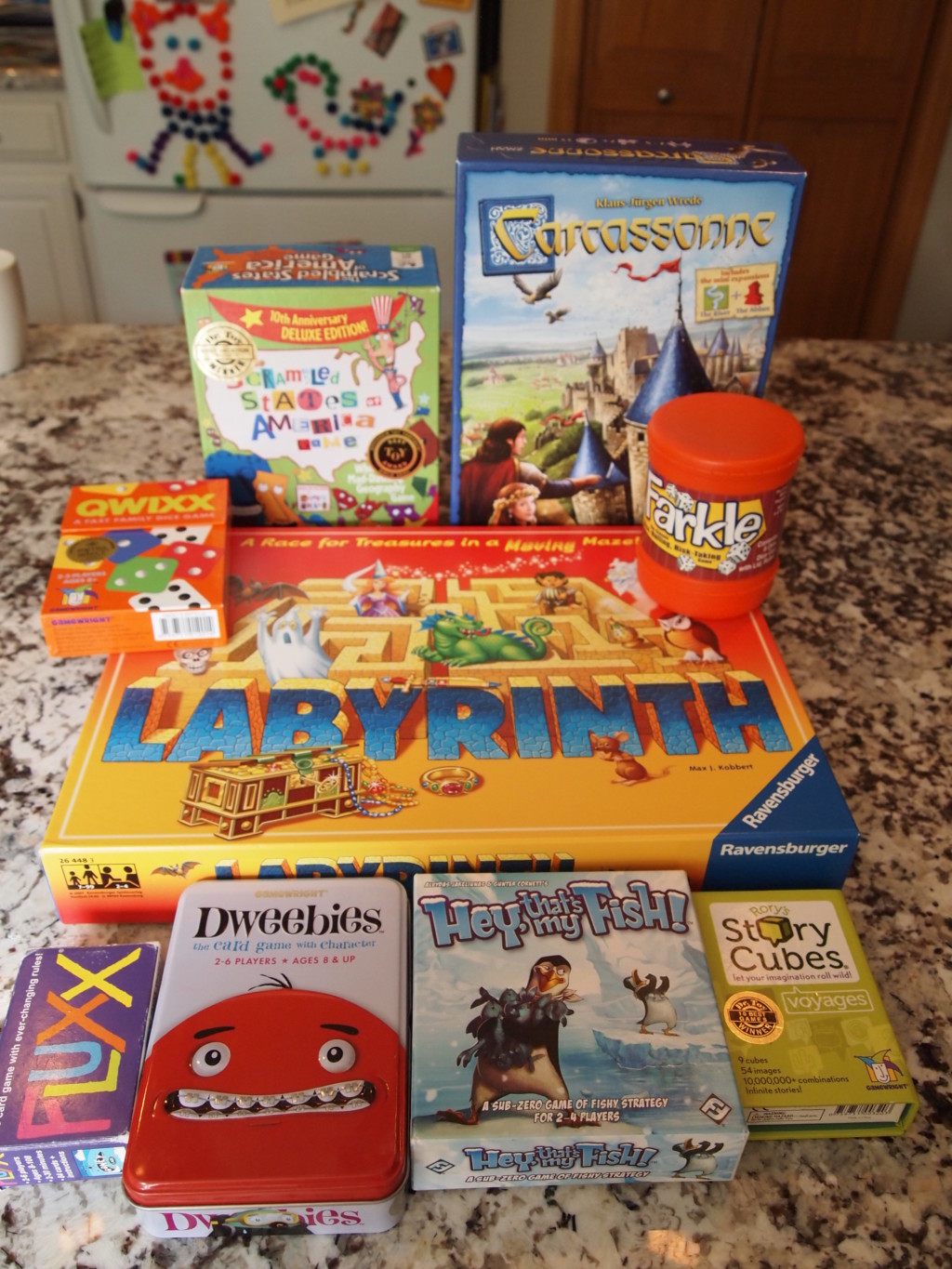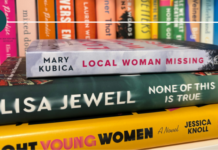Uno, Yahtzee, The Game of Life, Sorry, Monopoly, Chutes and Ladders, Perfection, etc. Some of those games may evoke strong feelings and vivid memories from childhood. Sorry was my least favorite game in the world when I was child! Chutes and Ladders was the least favorite of the games my son had when he was 3. (I got rid of it quickly when he lost interest.)
While my family still plays some competitive games of Uno (several over Mother’s Day weekend) and we have played Yahtzee a few times, we currently don’t own The Game of Life or Monopoly or Sorry. We like to spend time as a family playing games that we enjoy together. Spending time together having fun is the goal of playing games. Along with that comes some learning. Yes, your kid might learn some of these skills from games:
- Taking turns
- Following rules
- Communicating verbally with others
- Keeping cards/tiles a secret
- Not giving up when the going gets tough as luck (especially in a game) can change
- Negotiating
- Trading
- Planning
- Respecting boundaries (physical and social)
- Unplugging from all screens can be really fun.
A glimpse at what we are currently playing (or at least some of what we’ve played in the last 2 months):
Quixx is a dice game involving strategy and heavy doses of luck. A player’s goal is to cross out numbers of certain colors and within those rows of colors also cross out a certain number of squares to earn points. Reading is not required (numbers and colors are important), but the strategy involved and length of game may be the determining factor for a kid’s readiness for this game. Quixx is a purchase we made after going to I’m Board last summer and playing their demo version. My son promptly came home and tried to recreate it with paper taped to dice, so we needed to purchase it, as the paper taped to dice didn’t really make for a playable game! Quixx is in a small box and is, thus, highly portable for family vacations and other travel occasions.
Scrambled States of America is an educational game based on the book Scrambled States of America by Laurie Keller. A kid needs to be a pretty good reader for this game, but the kid does not have to have read the book by the same name to understand the game. The goal is to send states home based on playing cards with plays on them similar to “state that ends in A” or “borders the Pacific Ocean.” Player who sends the most states to their “home” pile wins. Knowledge of US geography and of at least state names is recommended to be quick enough to play against others. My kid has loved maps and states since he was nearly 3, so when he got this game at 5 years old it worked for him and he still loves it. States names, capital cities, and state nicknames are featured in the game. If you have a kid working on states and capitals memorization, this would be a great game to reinforce those!
Carcassone is a tile-laying game in which you build medieval walled cities, roads, farms, and abbeys to earn points. Players take turns laying tiles and placing their meeples (playing figures) to control features to earn points. While Carcassone doesn’t require a kid to read, it does make players plan and strategize. I’m not saying my kid always plans and strategizes well during every game, but he can play it with his family (including one grandma who has learned) and we can all enjoy the game. This game yields different results every time, so it has high replayability! This was a family holiday gift when my son was 5 ½ and he’s now 8. I predict he’ll continue to enjoy it for a long time.
Labyrinth is a game in which each player has certain objects in the labyrinth that s/he needs to reach. First person to reach all of his/her objects wins. You play by inserting one tile in row or column and creating an ever-changing labyrinth. Planning (and understanding the fact that your plans/strategy will be foiled by another player at some point) is key to this game, but reading is not. This game plays well for kids and adults, but can get long so plan ahead!
Rory’s Story Cubes sets are NOT really games, but they get you talking and laughing while telling what usually ends up being an absurd story. Your turn starts by shaking the 9 dice (each has 6 pictures on it) and starting the story with “Once upon a time” and choosing a picture from a cube to start the story. From there you take turns adding to the story based on the pictures of the cube until the final cube brings you to an improbable ending that has the players either laughing or groaning. Rory’s Story Cubes require no reading and are very small and often end up at airports with us. We have two sets (Voyages and Original) and mix them together for variety.
Other family games that we currently like:
Hey, That’s My Fish! (Penguins moving around ice floe tiles while collecting fish. No reading required.)
Bohnanza (Who doesn’t want to be a bean farmer! Earn points by planting fields of beans. Little reading required.)
Dweebies (The characters—aka Dweebies—are adorable. Goal is collecting Dweebies within the bounds of the simple to follow rules. No reading required.)
Fluxx (Ever-changing rules card game. Fluent reading, flexibility, and laughter required.)
Settlers of Catan (Trading and building strategy game. Some reading required, but can mostly rely on pictures.)
Farkle (Dice game somewhat similar to Yahtzee. My son and his grandpa have some running games going. This plays well with a large group.)
Pig Mania (aka Pass the Pigs. Earn points based on how the dice in the shape of pigs land. This is a game for laughter!)
Local sources for unique table-top and card games:
I’m Board, 6917 University Ave, Middleton, WI
Pegasus Games, 6640 Odana Road, Madison
Misty Mountain Games, 4672 Cottage Grove Rd, Madison
Netherworld Games, 334 W Mifflin Street, Madison
Most games stores have knowledgeable staff. If you want recommendations for games, talk to the staff and also seek out any demo versions of games a store might have and inspect to see if you think your family might like it. Many stores have open play time to allow customers to play demo versions in store. (We’ve done open play of demo games both with our kid and as a date night!) Many of the stores have weekly scheduled times for playing certain games. Check their websites/FB pages for that information. Also, talk to other parents. Chances are you know people who aren’t playing all of the same games you did when you were a kid. Ask them what they and their kids like playing together.
I’d love to find out what you are playing with your families. What is a hit? What has tested your patience? What must I go buy now for my kid? What should I avoid at all costs? Please share so we can all benefit.














Great topic Laura! I like games too as it’s a good way to interact with the kids but doesn’t require me to drive cars or trains for the 1000th time The almost 4 year old is doing good with Hi Ho Cherry-o and Trouble. The almost 7 year old likes Blokus, Yahtzee, and Battleship. He is even learning Chess and really seems to like it. Here’s to family game time!
The almost 4 year old is doing good with Hi Ho Cherry-o and Trouble. The almost 7 year old likes Blokus, Yahtzee, and Battleship. He is even learning Chess and really seems to like it. Here’s to family game time!